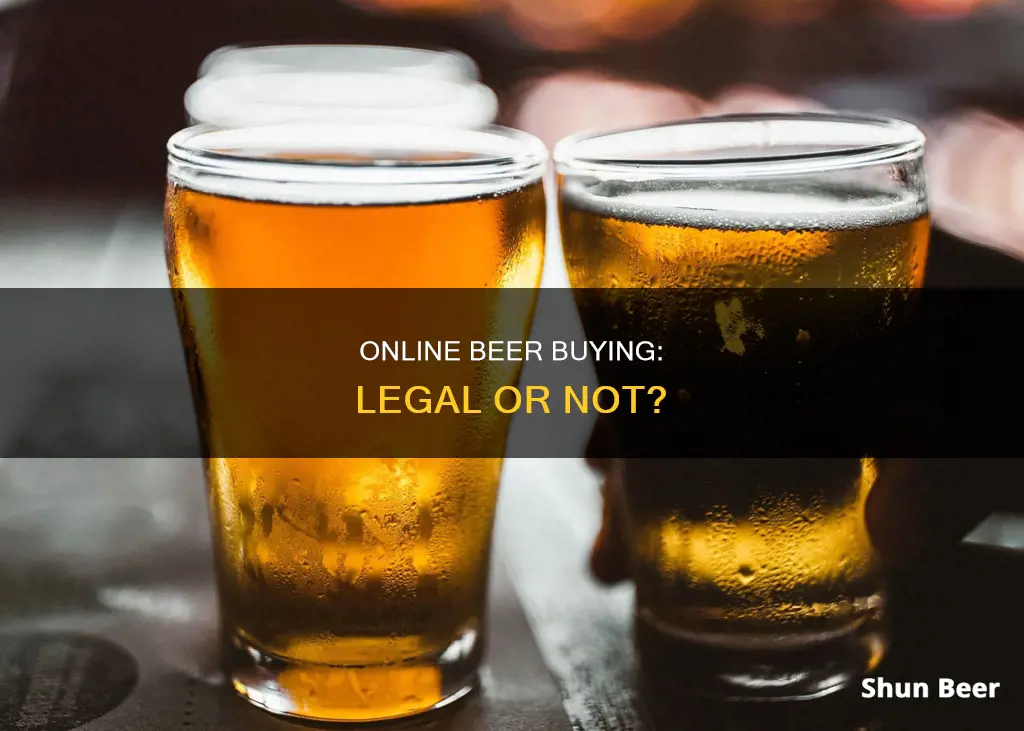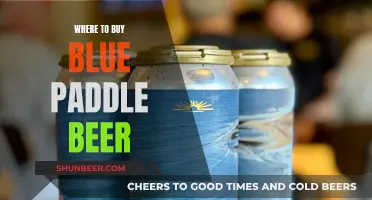
The laws surrounding buying alcohol online are complex and vary depending on the state and country. In the US, for example, online liquor sales are legal in most states but not all. State laws often impose regulations such as only allowing purchases from businesses with a valid liquor license, and limiting the amount of alcohol that can be purchased. These laws are a result of states having the freedom to create their own liquor laws following the end of federal Prohibition in the 1930s. While it is now possible to buy beer online in most states, the process can be challenging due to varying shipping regulations.
What You'll Learn

Online liquor sales laws vary by state
In the United States, the Twenty-first Amendment to the United States Constitution grants each state and territory the power to regulate intoxicating liquors within their jurisdiction. As such, laws pertaining to the production, sale, distribution, and consumption of alcohol vary significantly across the country.
While online liquor sales are legal in most of the United States, some state and local laws ban online alcohol deliveries. For example, Alabama had one of the country's last statewide bans on online consumer alcohol deliveries, but its Alcoholic Beverage Control Board (ABC) repealed it in 2021.
State laws often impose regulations on online alcohol sales, such as:
- Requiring customers to be at least 21 years old and provide a valid ID upon delivery.
- Limiting the amount of alcohol that can be ordered per person, day, or year.
- Prohibiting shippers from leaving packages containing alcohol in mailboxes or on doorsteps.
- Requiring customers to sign for their delivery.
Additionally, states might set different rules for various types of alcohol and for business or personal consumption.
- California: Relatively unrestricted; beer, wine, and liquor are available at grocery stores, convenience stores, gas stations, and warehouse clubs.
- Colorado: Beer is available in dedicated stores, many of which have drive-throughs. Liquor and wine are sold in special stores only, and all alcohol sales are prohibited on Christmas.
- Florida: Beer and wine are available in gas stations and convenience stores. Miami-Dade County liquor stores are open 24/7. There is a maximum alcohol content of 153 proof for liquor sales.
- Louisiana: Beer, liquor, and wine are available in bars and restaurants on Sundays. Liquor stores are closed on Sundays and certain holidays.
- Massachusetts: No individual, partnership, or corporation may have more than five off-premises liquor licenses in the state. Alcohol sales are prohibited on Memorial Day, Thanksgiving, and Christmas.
- Nevada: Liquor is sold in specialty stores, often at highway rest stops. There is a maximum alcohol content of 80% ABV. Public drunkenness and consumption are legal.
- New Jersey: There are some dry towns in the southern part of the state, including Ocean City. Chain stores can only have two licenses to sell alcohol, so finding alcohol in grocery stores and gas stations is rare.
- New York: There are 12 dry towns, mostly in the western region of the state. Many counties have more restrictive off-premises hours, such as bans on beer sales overnight.
- Ohio: Beer can be purchased at grocery and convenience stores, while spirits and wine can only be purchased at liquor stores. Cities with a population of over 50,000 may impose stricter hours of sale by local ordinance.
- Tennessee: Beer above 8% ABV must be sold in liquor stores. Open container laws only apply to drivers, not passengers. It is legal to carry alcohol in a non-glass container on Beale Street in Memphis.
Hudepohl Beer: Where to Buy and Enjoy It
You may want to see also

Age verification for online alcohol sales
The online sale of alcohol is a growing market, with online alcohol sales in the US reaching $1.7 billion in 2017. However, the sale of alcohol to underage persons is illegal, and retailers must ensure they have effective systems in place to prevent sales to customers who are underage. This means setting up systems capable of verifying the age of potential purchasers to ensure they are above the minimum legal age. These systems need to be regularly monitored and updated to identify and address any problems or weaknesses and to keep up with any advances in technology.
There is no definitive answer as to what constitutes taking all reasonable precautions or exercising all due diligence when it comes to age verification for online alcohol sales. However, retailers should undertake a risk analysis of their business to identify weak points where underage sales could occur and then introduce measures to counter those risks. For example, retailers should not rely on the purchaser confirming they are over the minimum age, asking the purchaser to provide a date of birth, using tick boxes to confirm age, or using a general disclaimer.
More robust age verification methods include online age verification software, which makes use of various sources of information to verify both age and identity during the ordering process, such as the electoral register and/or credit reference agencies. In some cases, purchasers may be asked to provide a scan of their driver's license or enter the last four digits of their Social Security number, with the merchant then conducting a background check. Some retailers may also require purchasers to register their details or set up accounts for future purchases, with age verification checks only required for the initial set-up or first purchase.
For retailers with a physical presence, such as a high street store, purchasers could view and reserve products online and then collect them in-store, where age verification could be carried out by staff as for a normal face-to-face transaction. Alternatively, some retailers partner with third-party delivery companies that have their own age verification policies, requiring customers to confirm their age when the order is placed and provide proof of age before the delivery is completed. However, it is important to note that third-party couriers may not accept responsibility for age verification, and it is ultimately the retailer's responsibility to ensure they do not sell age-restricted products to people under the minimum legal age.
Buying Beer at Kyle Field: Is it Possible?
You may want to see also

Shipping carriers for online alcohol sales
Shipping alcohol is a complex process due to the varying laws and regulations that govern it. In the United States, the laws regarding alcohol sales and shipping differ from state to state, making it crucial to understand the specific rules in each region. Here is a comprehensive guide to shipping carriers for online alcohol sales:
United States Postal Service (USPS)
The USPS strictly prohibits the shipment of alcoholic beverages. This ban stems from regulations that have been in place since Prohibition in the 1920s. Even though Prohibition was eventually repealed, the restrictions on shipping alcohol remained. Therefore, individuals cannot use standard postal services like USPS to send beer, wine, or spirits, regardless of the recipient's location within the United States.
UPS (United Parcel Service)
UPS is one of the few private carriers in the United States that allows alcohol shipping, but several conditions and rules must be followed. Firstly, you must have a valid alcohol shipping license under federal and applicable state laws. Secondly, you need to establish an alcohol shipping agreement with UPS, which requires the appropriate license. The packaging guidelines set by UPS must be strictly adhered to, ensuring that bottles are securely packed and appropriately labelled. Additionally, UPS mandates an "Adult Signature Required" service, ensuring that shipments are signed for by an adult over the age of 21 upon delivery.
FedEx
FedEx also permits alcohol shipments for businesses, including wineries, breweries, and licensed distributors. Similar to UPS, FedEx requires a valid alcohol shipping license and an alcohol shipping agreement that outlines compliance with their specific requirements. Proper and secure packaging is essential, and FedEx mandates that an adult over 21 signs for the package upon delivery. However, it is important to note that FedEx does not allow individuals to send alcohol as gifts; it is restricted to licensed businesses.
Licensed Retailers and Subscription Services
If you are an individual looking to send alcohol to a friend, the best option is to purchase from licensed online retailers or subscription services that have the necessary licenses to ship alcohol to most states. These businesses have the required shipping agreements in place and can handle the legal complexities of shipping alcohol.
International Shipping
Shipping alcohol internationally is even more complex due to customs regulations and international trade laws. Carriers like UPS and FedEx offer international alcohol shipping, but the rules vary significantly between countries. It is crucial to research the destination country's import laws, prepare the necessary documentation, and ensure safe and secure packaging to withstand longer transit times.
Evening Beer Runs in Texas: Understanding the 9 PM Rule
You may want to see also

International alcohol shipments
In the US, individuals cannot ship alcohol via FedEx. Businesses with the appropriate alcohol licenses and enrolled in the FedEx alcohol shipping program may ship to customers in select countries. FedEx International Ground® service cannot be used for international alcohol shipments. Licensee-to-consumer international alcohol shipments are only permitted via FedEx Express services and only to certain countries or territories. These include Hong Kong SAR, China, Labrador & Newfoundland, Prince Edward Island, and the United Arab Emirates.
For US import shipments, the shipper must hold a license from the country/territory of origin, issued in accordance with that country or territory's laws and regulations. For export shipments, the shipper must be a FedEx-approved alcohol shipper.
Licensed alcohol shippers may import alcohol to the USA with authorised couriers if they comply with state laws and local regulations. However, most postal services prohibit sending alcoholic beverages through the mail.
In the UK, shipping alcohol by mail or courier to Europe is not allowed for individuals. Only licensed companies can ship alcohol from the UK to Europe and vice versa, and the goods will have to pass through customs clearance with associated VAT charges and duties.
Most courier companies consider alcoholic beverages as restricted or prohibited items for private shipments. Each courier company has specific limitations regarding the percentage of alcohol by volume (ABV) and the total volume that can be shipped per package. It is important to check the regulations of the specific courier company you are using.
When sending alcohol internationally, it is important to ensure that the item you are shipping is allowed to be imported/exported between the countries of pickup and delivery. This is applicable even within the European Union, as alcohol is a state-regulated item.
Shipping alcoholic beverages in glass bottles is more dangerous than cans or plastic bottles due to the risk of breakage. Proper packaging is essential to ensure the safety of the shipment.
Where to Find Lone Girl Beer in Stores?
You may want to see also

Alcohol sales and the US Constitution
Alcohol sales and the laws that govern them in the United States have a long and complex history that is intimately tied to the US Constitution. The Eighteenth Amendment, proposed by Congress on December 18, 1917, and ratified on January 16, 1919, established the prohibition of alcohol in the United States. This amendment was the result of decades of efforts by the temperance movement, which argued that banning alcohol would address various societal issues, including poverty and immoral sexual behaviour.
The Eighteenth Amendment declared the production, transport, and sale of intoxicating liquors illegal, though it did not prohibit consumption. To enforce this amendment, Congress passed the Volstead Act, which defined liquors, wines, and beers as intoxicating liquors and thus prohibited them. The amendment and its legislation led to a decline in alcohol consumption, particularly among low-income groups, and initially reduced alcohol-related hospitalisations and crimes associated with drunkenness.
However, the nationwide enforcement of Prohibition proved challenging, and illegal importation and production of alcoholic beverages, as well as illicit bars, became prevalent. This period also saw a rise in organised crime, with gangs controlling the distribution of alcohol and reaping huge profits. Public sentiment began to turn against Prohibition during the 1920s, and Franklin D. Roosevelt's 1932 presidential campaign included a call for its repeal.
On December 5, 1933, the Eighteenth Amendment was repealed by the Twenty-First Amendment, which allowed states to regulate or prohibit alcoholic beverages within their jurisdictions for legitimate reasons, such as health and safety. This amendment did not remove Congress's power over the manufacture, sale, and transportation of alcohol under the Commerce Clause. The federal government has continued to tax and regulate activities involving alcoholic beverages, including production, distribution, importation, and advertising.
Today, the sale of alcohol in the United States is governed by a mix of federal, state, and local laws. While online liquor sales are legal in most of the country, some state and local laws ban online alcohol deliveries. These laws vary across states, and it is essential to check the regulations in one's state before placing an order.
Great America's Beer Availability: Buy and Enjoy!
You may want to see also
Frequently asked questions
It depends on where you live. Online liquor sales are legal in most of the United States but not everywhere. Some state and local laws ban online alcohol deliveries.
You must be at least 21 years old to buy beer online.
The amount of alcohol you order must not exceed a given limit, usually per person, day, or year.
Yes, in general, you can order out-of-state beer if your state allows the online sale of beer.
No, federal law prohibits the United States Postal Service from carrying alcoholic beverages. Private carriers such as FedEx and UPS can ship and deliver beer.







